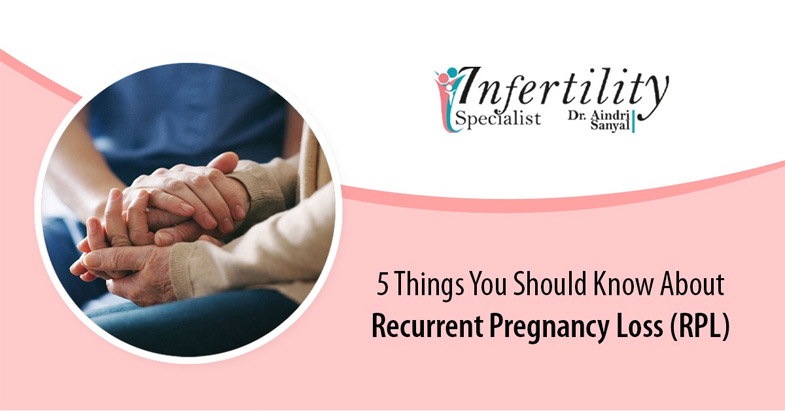
Pregnancy loss is usually hard to deal with and difficult to discuss. It is sad and personal, but not uncommon or unnatural. Certain myths surrounding pregnancy losses often make it harder for the person going through it. This blog tries to unravel long-standing misconceptions about pregnancy, miscarriage, and recurrent pregnancy loss and start an open conversation that may lift the burden of secrecy and stigma, and help couples cope with recurrent pregnancy loss, understand the furture implications.
What is Recurrent pregnancy loss?
Recurrent pregnancy loss or RPL is defined as having two or more miscarriages. After two miscarriages, an examination and testing are recommended.
What tests are available to find the causes of repeated miscarriages?
To help find the cause of repeated miscarriages, your healthcare professional will ask about your medical history and past pregnancies. A complete physical exam, including a pelvic exam, might be conducted. You may have to undergo blood tests to detect underlying issues with the immune system. Testing can be done to detect genetic causes of repeated pregnancy losses. Imaging tests may be considered to find if a uterine problem is causing recurrent pregnancy loss.
Can recurrent pregnancy loss cause infertility?
There is no evidence to suggest that RPL causes infertility. However, there is a possibility that a woman who has experienced pregnancy loss might experience another. This is most commonly due to underlying health conditions.
What causes recurrent pregnancy loss?
According to ACOG, approximately 60% of all recurrent miscarriages are a result of a genetic abnormality. As a woman ages, the risk of miscarriage resulting from genetic abnormalities increases – from 15 to 20% if she is under 35, to more than 50% if her age is over 40. The common causes of pregnancy loss include the following:
Genetic abnormalities can occur when an embryo is the recipient of an abnormal number of chromosomes during fertilization. In approximately 2–5% of couples with recurrent miscarriage, one of the partners carries a balanced structural chromosomal anomaly (Reciprocal or Robertsonian translocation). Their pregnancies are at ncreased risk of miscarriage and may result in a live birth with unbalanced chromosomal arrangement. The risk of miscarriage is influenced by the size and genetic content of the rearranged chromosomal segments.
Anatomic abnormalitiesA septet uterus, in which a wall of tissue divides the uterus into two sections, occurs commonly and may result in recurrent pregnancy losses. While it is not clear why this leads to recurrent pregnancy losses, some believe that poor vascularity in the septum prevents the embryo from growing if it implants there. If the pregnancy makes it to term, the fetus may be breech. However, removing a uterine septum is easy surgically. An incompetent cervix cannot remain closed due to weakened muscles. As the developing fetus reaches a certain weight, the weakened cervix cannot support the fetus and often results in miscarriage.
Medical conditionsCertain medical conditions tend to increase the risk of recurrent pregnancy losses, including:
- Antiphospholipid syndrome (APS) – An autoimmune disorder that occurs when a person’s immune system makes antibodies necessary for blood clotting
- Thyroid/hormonal issues – An overactive or underactive thyroid can result in hormonal imbalances, which can cause a miscarriage if the uterine lining does not develop normally for implantation and nourishment of a fertilized egg. Elevated prolactin (reproductive hormone produced in the pituitary gland) levels can alter the development of the uterine lining
- Fibroids and polyps – Non-cancerous growths that can invade the uterus
- Asherman’s syndrome – A condition where scar tissue forms inside the uterus, causing miscarriage
How is Recurrent Pregnancy Loss treated?
The treatment of RPL must be based on imaging, clinical, and laboratory findings. Couples in which one of the partners carries a chromosomal rearrangement or abnormality should be referred for genetic counseling to discuss the probability of viable pregnancy based on the chromosomes involved. Women with intrauterine adhesions, a uterine septum, or uterine fibroids (especially submucosal fibroids) can choose surgical corrections, which per research is associated with reduced risk of pregnancy losses.
Next Steps Following Pregnancy Loss
It is essential to know that pregnancy loss does not mean that you will not be able to have children. Most people suffering a miscarriage will go on to give birth to a healthy baby. Even if pregnancy loss is recurrent, there are still treatment options. Besides a fertility specialist, a reproductive endocrinologist is often the go-to-specialist (or is part of the team) that offers treatment for recurrent pregnancy loss.
What to Expect from a Fertility Specialist in Kolkata Following an RPL?
Your experience with a recurrent miscarriage specialist will start with a consultation visit where you can expect to discuss the medical history and plan further evaluation. For a thorough diagnosis, your partner also needs to attend the initial appointment. Depending on your needs, you may be referred to a fertility specialist in Kolkata, who may ask you to take a range of tests, including some anatomical, hormonal, and autoimmune ones. Those undergoing the procedures can get home the same day. Once a fertility specialist is aware of the problem, they can even recommend a fertility treatment plan tailored for your needs.


